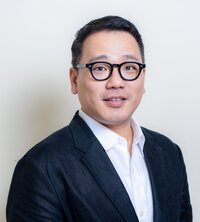


助理教授
Ph.D. McGill University (Department of Art History & Communication Studies)
M.A. Seoul National University (Department of Communication studies)
KKB 321
3943-4272
Yongwoo Lee is Assistant Professor in Cultural Studies and Associate Director of the MA in Cultural Management Programme at the Chinese University of Hong Kong. His research and teaching interests focus on media and cultural studies in East Asia, contemporary Asian visual art and criticism, visual/material and popular culture in East Asia and Sensorial modernity; Cultural history of collective memory and trauma in East Asia, film theory and Global Aesthetic of East Asian cinema, sound studies, popular music & critical musicology, critical theory and intellectual history of wartime Japan and postwar Korea, representation of animal others in the East Asian media, and post/colonial historiography.
Before coming to CUHK, Professor Lee was Research Associate Professor at Critical Global Studies Institute at Sogang University (2020-2021), Assistant Professor/Faculty Fellow at New York University in the Department of East Asian Studies (2015-2018), and an affiliated fellow at Leiden University’s International Institute for Asian Studies (IIAS), Netherlands, and ISEAS-Yusof Ishak Institute in Singapore (2014-2015). Prior to that, he was a Mellon Postdoctoral Fellow of Society for the Humanities at Cornell University (2010-2012) and Research fellow (特别研究员)in Graduate School of Interdisciplinary Information Studies at the University of Tokyo as a recipient of the Japan-Korea Cultural Foundation Fellowship(2006-2007).
He has published on Contemporary East Asian Art, visual culture and criticism, media & popular culture in East Asia, the discourse of cultural modernity and postcolonialism in a number of edited books, journals and catalogs including Superhumanity (University of Minnesota, 2018), 2 Oder 3 Tiger: Koloniale Geschichten, Medien Und Moderne(Matthes & Seitz Berlin, 2017), Suki Seokyeong Kang : Black Mat Oriole(ROMA publications, 2019), Divided We Stand: 9th Busan Biennale 2018(Sternberg Press, 2019), MMCA Hyundai Motor Series 2020: Haegue Yang―O₂ & H₂O (Hyunshil Publishing, 2020), Jane Jin Kaisen: Community of Parting(Archive Books, 2020), Golden Era of the 1960s-1970s Cambodian Lost Rock and Roll (Hyunshil Book 2021), Hyundae Munhak(现代文学, 2017), Asian Cinema Journal and e-flux. He is currently revising two book manuscripts, (1) Embedded Voices in Between Empires: The Cultural Formation of Korean Popular Music in Modern Times, which explores the historical trajectory of colonial mentalities and the genealogy of cultural modernities and Americanization in South Korea by recontextualizing popular music as a narrative of collective memories and mass trauma; and (2) Asian Divas: The Voices of Acoustic Modernities in Asia. His new book project aims to explore multifarious ways in which colonialism, Americanism, and Cold War fascism in East Asia shape modern Korean society and material culture and how postwar cultural forms and their representations were shaped and invented by various hegemonies--dictatorial governance, the implicit Japanese colonial legacy, and American military rule during the Cold War era chief among them--by examining South Korean popular songs, female performers and Cold War propaganda films in the 1960s and 1970s.
As a curator and artistic researcher, Prof. Lee served as Senior Researcher at the Asia Culture Institute, Asia Culture Center of the Ministry of Culture, Sports and Tourism, Republic of Korea (2013-2014). He has been engaged in various curatorial project as a curator closely related to his research topic, such as <Colors of Yoo Youngkuk> (Kukje Gallery, Seoul, 2022), <Asian Diva: The Muse and The Monster> (Buk-Seoul Museum of Art, Seoul, co-curated, 2017), <the 1st Anren Biennale: Today’s Yesterday> (Anren, China, guest curator, 2017), Para Site’s <Soil and Stones, Souls and Songs> (Hong Kong, Manila and Bangkok, guest curator, 2016-2017), and <Robert Mapplethorpe : More Life> (Kukje Gallery, Seoul and Busan, 2021) and <Naming the Nameless> (Seoul Museum of Art, SeMA Bunker, Seoul, 2021)